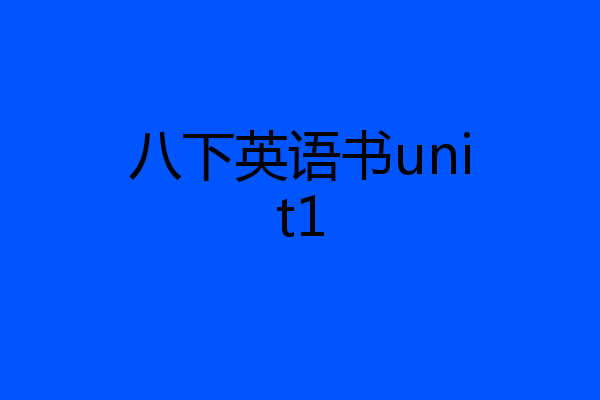
神仙鱼左倾45
新课标八年级英语下册各单元知识点汇编 Unit 1 一、本单元能力目标 1. 学会运用 will 表示一般将来时; 2. 掌握一般将来时的一般问句及其简略回答; 3. 理解 more, less 和 fewer 表示量的用法; 4. 比较一般现在时、一般过去时和一般将来时的用法; 二、本单元知识点 1. paper 【讲解】⑴ 名词,纸。纸张,不可数。 【举例】—Can you pass me some paper? ⑵ 报纸,试卷,论文,报告,文件,可数。 【举例】—What news is there in the papers this morning? 今天早上报纸里有点什么新闻? 【拓展】 paper flower 纸花 ,paper-cut 剪纸 ,a piece of paper 。 2. use 【讲解】⑴动词, “用,使用,利用” 【举例】—May I use your pen? 我用一下你的笔可以吗? —He uses a clock to wake him up . ⑵ 名词, “用途,,使用” 【举例】—These dictionaries are of great use . 这些词典十分有用。 【拓展】useful 有用的, useless 无用的, used 用过的,user 使用者。 3. money 【讲解】 “金钱,货币” ,不可数。 【举例】—We need some more money. 我们还需要些钱。 —Money can't buy happiness. 金钱买不来幸福。 【拓展】常见货币: (你知道这些货币的意思吗?) yuan( )dollars ( )pounds( )yen( )euro( ) 4. agree (见上册笔记第 11 单元) 【讲解】agree 的常见用法 ⑴ agree to +sth (办法、计划) suggestion,advice,plan 等。— My father agreed to this plan . ⑵ agree with sb 或 agree with what sb said. — I quite agree with what he says . ⑶ agree to do sth 同意做某事 — We agree to go swimming . ⑷ agree on 一般接 point,price,date,address 等双方协定的内容。 5. more , fewer and less 【讲解】more 既可以修饰可数名词,又可以修饰不可数名词。fewer 只可修饰可数名词。 less 只可修饰不可数。 【练一练】We’ll tey our best to do the work with _______ money and ______ people . A. little; few B. less; fewer C. fewer; less 6. family , house , home 【讲解】family 指家庭,家人。 house 指居住的房屋。 home 指一家人共同生活的地方, 强调家的氛围和环境。 7.every , each 【辨析】every 和 each 用法上的区别 ⑴ each 可作代词和形容词,而 every 只能用作形容词,如可以说 each of these dictionaries,(你知道为何不能说?)every of these dictionaries, 该用 every one of these dictionaries。 ⑵ each 可指两个或两个以上中间的每一个, every 只可指三个或三个以上中间的每一个, 而 不能指两个中每一个。 ⑶ each 通常用来指若干固定数目中的每一个,而 every 往往指 “任何一个”如:Each girl sitting over there is my student. “坐在那里的每一女孩子”指若干固定数目中的每一个,故用 each。Every man must do his best. “人人都尽最大的努力”泛指任何一个人,因而用 every。 ⑷ every 和 not 连用,即“every…not”或“not…every”构成部分否定,表示“并非每一个”的意 思,each 则无此结构。 ⑸ every+ 基数词+ 复数名词。作 “每隔(多少)”解,但 each 不能用于这一结构中。 如: every three days 每三天或每隔两天。 “每隔一天”人们都用 every other day 来表示这一意思。 8. in 和 after 【辨析】介词 in 和 after 都可以表示“一段时间后” ,但 in 只跟一段时间,用于一般将来时。 而 after 后跟一段时间用在一般过去时,跟具体时间可用一般将来时。 【举例】— He will finish the homework in two hours.(将来时态) — He left his office after ten minutes.(过去时态) — He will arrive after 10 o’clock . (将来时态) 9. fly 【讲解】不及物动词 , ⑴飞;飞行 【举例】—Several birds flew across the sky . 几只鸟飞过天空。 ⑵乘飞机旅行 【举例】—I’ll fly to London tomorrow. 我明天搭飞机去伦敦。 ⑶飞跑,飞奔;(时间)飞逝 【举例】—He flew out of the room. 他从房间里飞奔出来。 — How times flies ! 光阴似箭 及物动词 ⑴ 驾驶(飞机,火箭) 【举例】— I’ll fly rockets to the moon . 我将驾火箭去月球。 ⑵ 使飞;放(风筝) 【举例】—Our boys are flying kites. 我们的孩子们在放风筝。 10. fall 【讲解】⑴ 落下,降落 【举例】—Autumn came and the leaves started to fall . ⑵ 跌倒 【举例】—The little boy fell over and hurt his knee . ⑶变成 ,相当于 become 。 常见搭配 fall asleep , fall ill 【拓展】动词:⑴(日期)恰逢 -Nationa Day falls on a Monday this year .⑵(温度,价格) 下降 The temperature is falling now . ⑶ 降临 Night falls 。 名词: 瀑布,秋天 【常见短语】 fall back 后退; behind 落后; down 跌倒; off 从…上落下; away fall fall fall fall 背离,离开 ;fall in love with 爱上,沉迷 11. alone 和 lonely 【辨析】⑴ alone 表示“单独,独自一人” ,不含感情色彩。 ⑵ lonely 表示“寂寞的,孤单的” ,有浓厚的伤感色彩。 ⑶ lonely 表示“偏僻的,人迹罕至的”【举例】—I don’t dare to go out alone at night . 在晚上我不敢独自外出。 — He lives alone , but he isn’t lonely . 他独自一人居住,但并不感到寂寞。 — Only old people and children live in this lonely mountain village 只有老人和孩子住在这荒凉的山村 12. dress 【讲解】动词, “穿衣,给…穿衣,打扮” dress 做及物动词后接人作宾语,不可接衣服类 的名词,例如:dress sb/oneself 【举例】—She dressed her son quickly. 【拓展】名词,女裙 【举例】—Today she’s wearing a beautiful dress . 【辨析】⑴ wear 表状态,可以表示穿衣戴帽,戴花、奖章等,穿戴的范围较广。 【举例】—She is wearing a coat/a flower. ⑵ put on 表示穿戴的动作,如:Put on your coat. ⑶ be in+颜色名词/衣服名词 表示状态。如:She is in white. 【练一练】 The woman _____ the baby and carried her in her arms . A. put on B. wore C. dressed 13. even 副词 【讲解】⑴ (加强语气)甚至;连 【举例】—Even Mrs. Smith could not help laughing. 甚至史密斯太太也忍不住笑了起来。 ⑵ (用于比较级前)甚至更,还 【举例】—This book is even more useful than that. 这本书比那本更加有用。 14. sound , voice , noise 【辨析】⑴ sound 泛指任何声音,不论其高低、是否悦耳等,泛指一切可以听见的声音。 【举例】—I heard the sound of running water. 我听见流水声。 —Light travels faster than sound. 光比声音传播得快。 ⑵ noise 表示“噪音、喧闹”,指的是人们不愿听到的声音或嘈杂声。它可以作可数 名词,也可以用作不可数名词。 【举例】— I heard some strange noises last night. 昨夜我听见一些奇怪的响声。 —


0度空间的鱼
What's the matter?1 matter n.问题,事情2What's the matter ? 怎么了? 出什么事了?3 sore adj.疼痛的,酸痛的4 have a cold 感冒5 stomachache n.胃痛,腹痛6have a stomachache 胃痛7 foot n.足,脚8 neck n.颈,脖子9 stomach n.胃,腹部10 throat n.咽喉,喉咙11 fever n.发烧12lie(pt.lay)v.躺,平躺13 lie down 躺下14 rest v&n.放松,休息15 cough v.咳嗽16 X-ray n. X射线,X光17 toothache n.牙痛18 take one's temperature 量体温19 headache n.头痛20have a fever 发烧21break n.间歇;休息22 take breaks(take a break) 休息23 hurt v.(使)疼痛,受伤24 passenger n.乘客,旅客25 off adv.&prep. 离开(某处);不工作;从……去掉26 get off 下车27 to one's surprise 使……惊讶的,出乎……意料28 onto prep.向;朝29 trouble n. 问题,苦恼30 hit(hit) v.(用手或器具)击,打31 right away 立即;马上32 get into 陷入;参与33 herself pron.(she的反身代词)她自己34 bandage n.绷带 v.用绷带包扎35 sick adj.生病的;有病的36 knee n.膝盖,膝37 nosebleed n.鼻出血38 breath n.呼吸39 sunburned adj.晒伤的40 ourselves pron.(we的反身代词)我们自己,自己41 climber n.登山者;攀登者42 be used to 习惯于……,适应于……43 risk n&v.危险,风险44take risks(take a risk)冒险45 accident n.(交通)事故;意外遭遇46 situation n.情况,状况47kilo (=kilogram) n.千克48 rock n.岩石49 run out (of) 耗尽50 knife n.(pl.knives) 刀51 cut off 切除52 blood n.血53 mean v.意思是,打算,意欲54 get out of 离开,从……出来55 importance n.重要性,重要56 decision n.决定,抉择57control n.﹠v.限制,约束,管理58be in control of 掌管,管理59spirit n.勇气,意志60 death n.死,死亡61 give up 放弃62 nurse n.护士63Judy朱迪 (女名)64Nancy南希 (女名)65Mandy曼迪 (女名)66Aron Ralston阿伦·罗尔斯顿67Utah犹他州(美国)
优质英语培训问答知识库